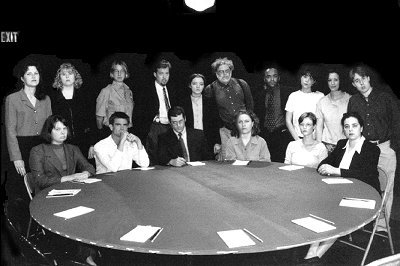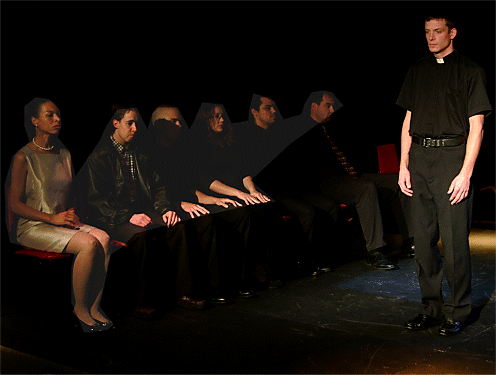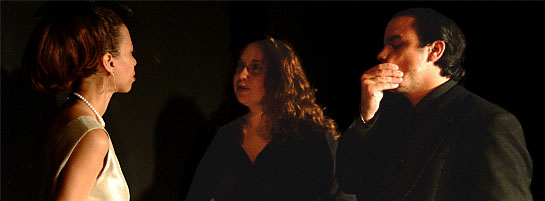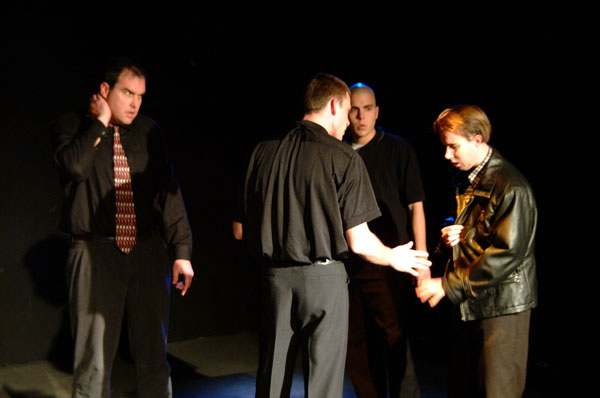![]()
Lee Strasberg on the Actors Studio
From the beginning, the Actors Studio was created as a workshop, a place where actors could work on the elements of their art apart from the concerns of production. Emphasis was (and still is) placed on the process by which the actor attains the results of “creative inspiration”, rather than a pre-determination of those results in an attempt to deliver a “finished performance”.
What follows are exerpts from a casual “lecture” Lee Strasberg delivered at the Actors Studio in 1975. It happened that there were no scenes prepared for the Friday session this particular week, so Strasberg decided to use the time to talk about the purpose of the Actors Studio, as well as certain concepts which precluded its origin.
Occasionally, I’ll include my own observations in the form of “NOTES” if I feel I can add something useful based on my own experiences at the Actors Studio.
![]()
The origin of the Studio, as I may have mentioned before, really came from some of the people who had been in the Group Theatre. Kazan, Robert Lewis, Cheryl Crawford, producer, who had been in the Group Theatre, and who felt that they had been subjected to a stimulus in the Group Theatre which did not exist in the rest of the American Theatre.
And when they became… when Kazan began to be “Kazan”, and Robert Lewis had a success or so, and so on and so forth, and Cheryl Crawford had a beautiful musical… uh… Brigadoon…and so on, and a few other things that she did…they, even though they were satisfied with their success, nonetheless felt that there was something missing, obviously in their own feeling, not in their own work… because I think that the work of Kazan comes as close, if not closer, to being the kind of ensemble work that was done by the Group Theatre, except that it was a little bit more ensemble than even his own productions were.
But certainly his productions, because of the casting and so on, often may be individually in part superior to those of the Group Theatre, so that it wasn’t that he lacked anything.
And the early productions of Robert Lewis, the same thing, in the, uh, Teahouse of the August Moon and so on. These were things which fitted his style, and from which he did very lovely and beautiful work… uh, so it didn’t come out of a feeling that they needed something, and yet obviously they did.
You see, they felt that they wanted to share something, to give something. I remember when I came back from Hollywood in ’48, I’d been here [Hollywood] for a few years and I came back to New York, uh, Miss Crawford’s production of Brigadoon was still running, beautiful production, lovely, very well done by Robert Lewis by the way, and brilliantly the dancing by Agnes DeMille, who at that time did a number of the early American kind of choreography, which really revolutionized in a way, together with Jerry Robbins, the American musical stage. Robbins more so because he dealt with a totality… and Agnes, not less so, but in a more confined way, because she dealt mainly with the choreography itself, and not with the totality of the direction of the entire play, and so on.
And Miss Crawford felt that she had a hit, she was making money… she wanted to return some of it to the people… who were in the show. Now, those people whose salary she raised, she raised, but some of the other people… what could she give them? There wasn’t much that she could give them after a certain point, because after all it was a profit making thing. She has to, in that sense, be responsible to her investors and to herself, and so on and so forth…
So there was a point at which she couldn’t do more with that, and yet she still wanted to do something for the people. So she hired me to give a weekly session for the members of the company of Brigadoon. You see, an acting “session”, which they appreciated and enjoyed. It cost her less money than it would have cost if she had to give other people more, you know, and so on, and yet for something that the people seemed to appreciate, and in fact there were some people from other companies that came
And I remember Eli and Annie, who weren’t in Brigadoon, and a few other people came in were permitted to attend those sessions.
So, in other words, the people that started the Actors Studio, these three people, started it out of a feeling that there was something that they had been part of in the Group Theatre which they wanted to maintain, wanted to continue. Because they felt that created an ambience, an environment… a spirit… an influence… which had affected their work.
And it made them constantly seek to be better, not to settle for whatever, you know, the critics would say, you know, the good work that the people were doing by that time, but that would stimulate them somehow as they felt they had been stimulated in the Group Theatre.
That’s what they started the Group Theatre for. It was not started to give people who were not actors an opportunity to learn to act. It wasn’t started for people who were not yet known to become known. It wasn’t started for people who might become stars to become stars, you see, or anything like that.
Obviously the directors of the Actors Studio at that time in their choice [of whom to invite in] showed very fine awareness, very fine taste, and chose people whose talent they admired. And they felt that if the talent of these people, which was already apparent, they didn’t need them to see it… but if the talent of these people was somehow stimulated and nurtured, many of these people would become the outstanding theatre people, from the acting point of view, in America.
Actually, their vision, and their hopes and their intentions has been proven right.
But the purpose of the Actors Studio never was just to give a place for people to act, and to learn how to act. It was always for people who already were actors, and were acting not only quite satisfactorily, but in some instances with outstanding accomplishments, you see. To provide a place where these accomplishments would become the basis only for better work, never accepted as the final end of the work no matter how good it may be.
Because no matter what good work somebody does, he is then capable of better work tomorrow. It’s as simple as that. In the profession, both in the theatre and anywhere else, this is… not looked for. Because people are very satisfied with good work, if you’ve already done it, and are very willing to pay for you to do it again in another play. That’s what they usually buy for.
But for the actor, and for those people that came out of the Group Theatre, therefore were comitted somehow to a sense about acting in the theatre, which was seen in their productions, quite satisfactorily, so that they didn’t really seek simply a personal satisfaction, but they were desirous of creating an environment where the heritage or the stimulus or the spirit of the Group Theatre, which had pervaded them, which had stimulated them, which had helped them to achieve what they were doing, might be shared with other people, that were, from their point of view not as fortunate in having been part of that kind of background.




